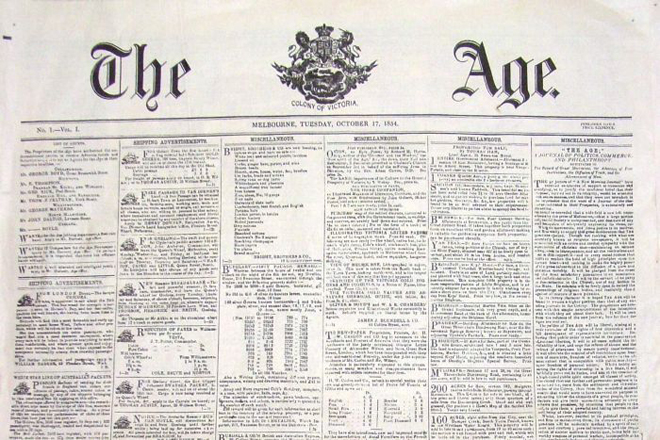Pride and Prejudice
 Judges •
Judges •  Thursday, October 10, 2013
Thursday, October 10, 2013 Failed application to remove Justice Kate McMillan from Victorian damages case against The Age ... Lengthy regurgitation of transcript ... Trying to get focus ... Failure to make notes ... Lack of judicial eye contact ... Misapplication of the word "garlic" ... Curt and non-embracing ... Alix Piatek reports
VICTORIAN Supremo Kate McMillan has come up with reasons for turning down an application that she disqualify herself from hearing a psychiatric injury case on the grounds of apprehended bias.
She rejected a former Age photographic editor's case for damages arising from trauma caused by covering the first anniversary of the Bali bombings.
That decision got a good airing in the daily tissues.
The apprehended bias judgment - less so. It arose from an application from Tim Tobin for the plaintiff on the 11th day of the trial for McMillan to recuse herself.
It reasons have been published nine months after the decision in December last year to reject the application.
McMillan's judgment is detailed and exacting, involving great slabs of transcript so that we can see what went on in the court.
The transcript shows there wasn't much meat on the bias bone.
There are 10 separate categories of McMillan's alleged AB.
- the manner in which she discharged witnesses;
- the requirement that opening submissions and a witness outline be provided;
- reactions to witnesses;
- comments made regarding the plaintiff's evidence and state of health;
- prejudgment of issues in the case during opening submissions;
- the strike-out application;
- time allowances given to the defence;
- objections and narrowing evidence;
- discovery during the trial; and
- a discrete comment made in relation to the plaintiff’s evidence.
Under these headings were a series of individual complaints - including the judge's attitude towards witnesses and that she was "very curt" and displayed a "non-embracing" demeanour.
Among the examples of curtness there was this:
HH: This witness may be excused?
Tobin: May be excused. Thank you, Your Honour.
HH: Yes. Thank you, Dr Wade ...
Tobin: Thank you, Your Honour.
Witness: Thank you.
HH: Thank you.
How's that for curt?
 There was a submission that at one point the bench became a beauty parlour while HH applied "nail clips or manicuring in some way".
There was a submission that at one point the bench became a beauty parlour while HH applied "nail clips or manicuring in some way".
She was also accused of reading the Accident Compensation Act 1985 at a time when it was not relevant.
Other complaints related to administrative and case management matters.
It was unfair to require the plaintiff to produce an outline of opening statements and a witness timetable, even though Tobin proposed to call 25 witness in 10 days.
So too allowing the defendant an adjournment to examine a DVD - the plaintiff claiming that The Age had been aware of its existence for over two years.
The judge also failed to proffer refreshments to distressed witnesses and to make eye contact with the plaintiff's witnesses. Further, she was not seen to be taking notes during examination of the plaintiff's witnesses.
As the judge put it:
"It was said that my lack of engagement with the plaintiff's witnesses was in contrast to my reaction to the two witnesses called by the defendant, where it was said that I looked at those witnesses most of the time when they gave their evidence‑in‑chief, and that I appeared to be taking notes regularly."

Also, the court allegedly made comments adverse to the plaintiff that demonstrated a consideration of the issues solely from the perspective of the defendant.
For instance, in relation to an application that the plaintiff be heard by video-link the judge said:
"It is an unsatisfactory state of affairs where the principal witness [the plaintiff] is going to be by video link or proposed to be by video link."
This was said to indicate a view that the plaintiff's lawyers were pursuing this course tactically or as a matter of choice.
It was said that this kind of prejudgment or perspective "infiltrates the whole case".
There was a complaint that the judge was reluctant to allow Tobin to call the plaintiff as his last witness, with an affidavit to be cross-examined, rather than giving evidence-in-chief.
There was discussion about whether the judge was biased in referring to the plaintiff's use of they word "garlic" - AZ regarded The Age's employment assistance program as akin to buying a book on eating garlic.
McMillan also had the temerity to tell a long-winded witness to get on with it.
Mr Place: I said that I'd really hoped that my thesis wouldn't be like the Arc de Covenant at the end of Raiders of the Lost Ark. I don't know if you remember that film, the place where the Arc de Covenant gets put in a wooden box and wheeled into a warehouse, sort of, with all the other wooden boxes.
HH: See if you could focus on the question?
Mr Place: I am.
These allegations alone would not suffice as evidence of apprehended bias, but collectively, Tobin argued, they satisfied the requirement that a fair minded lay observer would find the judge's conduct biased.
In her reasons McMillan referred to the court's powers in relation to case management and the direction of pre-trial and trial procedures - under the Civil Procedure Act.
She found that Tobin had not satisfied the apprehended bias test on the basis of the cumulative effects of the ten points he raised.
In wrapping-up her finding that she was not apprehendedly biased, McMillian reminded us of the supreme abilities of judges:
"A moment's inattention or distraction in the course of a hard fought, long trial does not mean that a judge is not following or comprehending the evidence given by a particular witness."
Reporter: Alix Piatek
 Apprehended bias,
Apprehended bias,  The Age
The Age 









Reader Comments